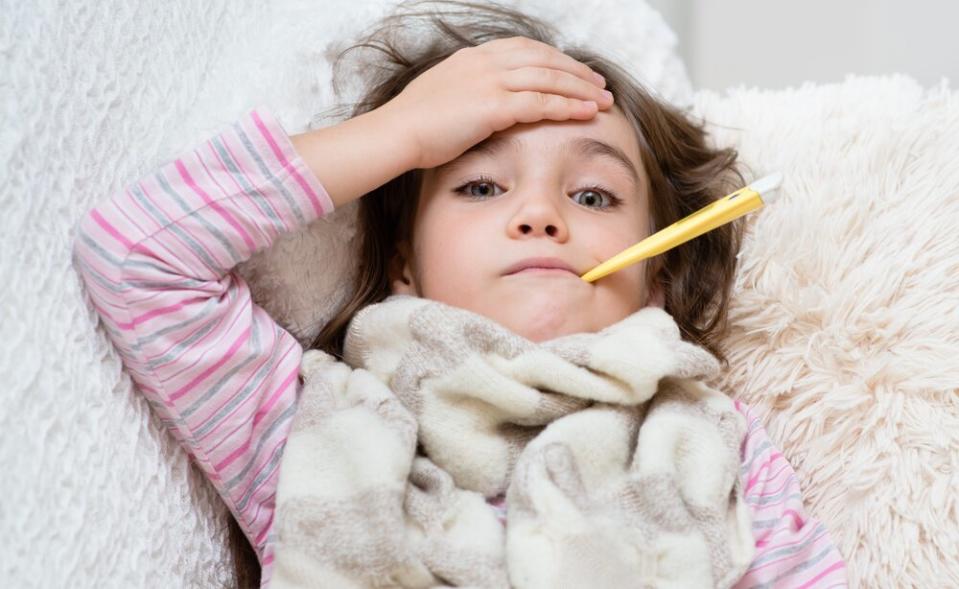7 Flu Treatments for Kids at Home
Influenza comes around every year, but you probably don't think much about it after you get your flu shots—that is, until a family member suddenly doesn't feel well. This illness is uncomfortable and inconvenient, so we asked experts to share the best at-home flu treatments for kids.

Ermolaev Alexander/Shutterstock
1. Get Vaccinated Before Flu Season
The CDC recommends that everyone over 6 months get the flu shot. Ideally, you should get vaccinated as soon as possible, or at least by Halloween, but you can receive the shot throughout flu season. The effectiveness of the flu vaccine varies each year, but it usually reduces the risk of illness by 40 to 60 percent, according to the Centers for Disease Control and Prevention (CDC). The shot also reduces the severity and duration of the flu, if you still happen to get it.
2. Nourish Children With Food and Fluids
The flu hits quickly and spreads rapidly, so it's helpful to have remedies on hand. You might, for example, feed your children frozen meals and soups, as well as ice pops because they feel good on sore throats and help keep kids hydrated.
Beverages with electrolytes, such as sports drinks and Pedialyte, are another smart staple. "Dehydration is always a concern when kids are sick. They may not want to eat, but it's essential to drink," notes Shari Platt, M.D., chief of pediatric emergency medicine at New York-Presbyterian/Weill Cornell Medical Center. Fruits and veggies with a high water content (like watermelon, oranges, cucumber, and bell peppers) also help with hydration and have a milder flavor if you're feeling nauseous.
3. Create a Comfortable "Sick Space"
Separate your ill family members from the rest of the crew. For younger kids, arrange a spot where you can keep an eye out, but avoid letting them go near food prep. "Designating a sick 'base camp' limits the spread and makes it easy to manage your patients," notes Michelle Davis-Dash, M.D., a pediatrician in Baltimore.
Stock it with blankets, disinfectant wipes and spray, tissues (give each family member a box), plenty of fluids, and any toys, books, games, crafts, or electronics your kid likes. You should also supply multiple layers of clothing or blankets to help with fever. Sick family members should use a separate bathroom (if you have one) and have a dedicated trash can with a lid and lined with a plastic bag to keep germs contained. When weather permits, open a window in the sickroom—or use a fan—to keep air circulating.
4. Try Natural Flu Treatments for Kids
A cool-mist humidifier adds moisture to the air, which might help with coughing and congestion. Little kids might benefit from mucus removal with a bulb syringe. Honey and warm drinks can relieve sore throats naturally.
5. Consider Using Over-the-Counter Medication
You can also give your kid acetaminophen or ibuprofen for a sore throat or a fever (ask the doctor first). Avoid giving your child aspirin, since it's associated with a rare but serious condition known as Reye's syndrome in children.
RELATED: The Truth About the Flu Vaccine
6. Ask About an Antiviral Prescription
An antiviral prescription, such as Tamiflu, can lessen symptoms and shorten the duration of the illness. It has to be given within 48 hours of the onset of symptoms, so an early diagnosis is key.
If you suspect your child has influenza, it's best to call your doctor's office or clinic and alert them first. You may be asked to enter and wait in a separate area. For some kids, especially those at high risk, the doctor may choose to phone in a prescription for an antiviral flu treatment, particularly when it's later in the season and the flu is already circulating.
"The CDC says that antivirals can also be given to other family members who aren't yet sick to prevent the flu," notes Flor Munoz, M.D., associate professor of pediatrics and infectious diseases at Baylor College of Medicine and Texas Children's Hospital, in Houston.
RELATED: Flu Symptoms in Children
7. Get Help If Needed
Although a bout of the illness is usually nothing more than uncomfortable and inconvenient, there's no way to tell how severe a case will be (especially in kids), so the threat shouldn't be taken lightly. Call your pediatrician right away if your child has difficulty breathing, accelerated heart rate, hives, wheezing, excessive drowsiness, high fever, or other worrisome symptoms. Also call the doctor if you have a baby with flu-like symptoms.

